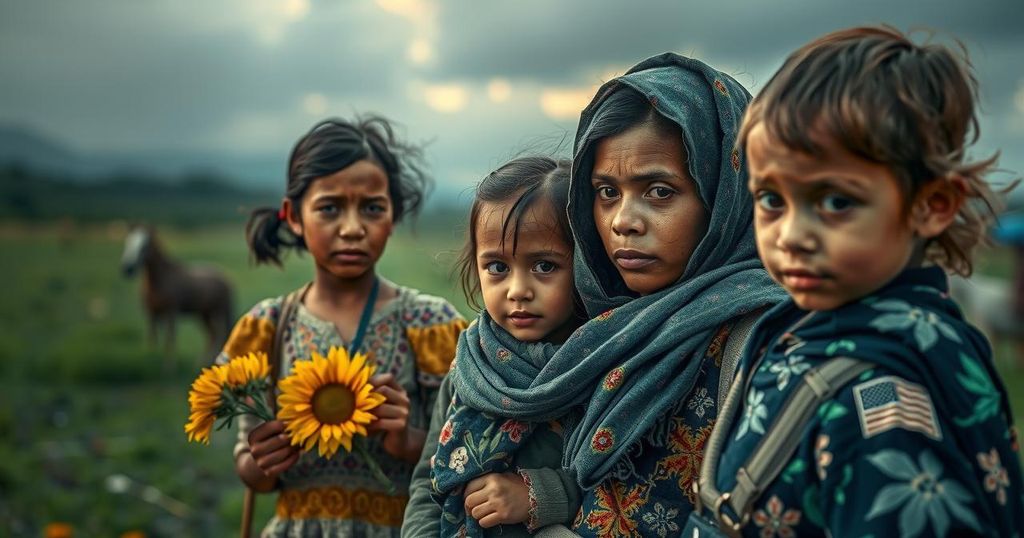Minister of Women Affairs Imaan Sulaiman-Ibrahim stated that 80 percent of climate change victims globally are women and children, urging for targeted interventions to support these vulnerable groups. She emphasized women’s significant role in food systems and agriculture and highlighted the health risks they face due to environmental challenges and traditional cooking practices. The minister commended Nigeria’s climate initiatives and the urgent need for women’s empowerment in driving sustainable solutions to effectively combat climate change.
Imaan Sulaiman-Ibrahim, the Minister of Women Affairs, has emphasized that 80 percent of those impacted by climate change globally are women and children, necessitating urgent interventions tailored to these vulnerable groups. At the ongoing United Nations Convention to Combat Desertification (UNCCD) COP16 in Riyadh, she stressed the importance of investing in women and children to mitigate climate-related impacts.
The Minister highlighted women’s pivotal role in global food systems, noting that they represent 70 percent of food processing and 60 percent of smallholder farmers. She stated, “Given their significant contributions, empowering women to participate in land restoration and sustainable practices is essential.” Furthermore, she raised concerns regarding the health implications faced by women using traditional cooking methods, revealing that such practices can expose them to health risks equivalent to inhaling 40 cigarette sticks per meal.
Sulaiman-Ibrahim pointed out that Nigerian women constitute over 50 percent of the population and are responsible for 70 percent of agricultural tasks. Their position makes them critical to the green economy as they have the capacity to seize opportunities for sustainable practices. The Minister elaborated on the socio-economic ramifications of land degradation, particularly in Nigeria’s northeastern regions, where climate change intensifies conflicts in the Lake Chad Basin, leading to displacement and increased vulnerabilities for women and children.
In the Northwest, the escalation of desertification threatens agricultural productivity and water sources, alongside rising challenges in the South such as coastal erosion and flooding. The Southeast region struggles with gully erosion, resulting in significant economic setbacks and displacement of residents.
The Minister commended the Nigerian government’s proactive climate initiatives, including the Climate Change Act, the formation of the National Council on Climate Change (NCCC), and the Energy Transition Plan. She also referenced Nigeria’s Nationally Determined Contributions (NDC) Implementation Framework for 2023–2030, designed to address climate change through innovative and adaptive measures. She reiterated that the Climate Gender Policy plays a crucial role in reinforcing women’s participation in climate action, stating, “Empowering women to participate in climate action catalyzes innovative solutions and builds community resilience.”
Sulaiman-Ibrahim called upon international organizations and development partners to equip women with necessary tools and platforms, allowing them to spearhead sustainable solutions against climate change. “If we are to reverse the effects of climate change, women must be at the forefront, driving sustainable solutions to achieve the relevant Sustainable Development Goals,” she concluded. The UNCCD COP16 in Riyadh provides a global platform for leaders to discuss urgent environmental issues, with Nigeria demonstrating its commitment to combating desertification and fostering inclusive climate action.
Climate change disproportionately impacts women and children, with estimates showing that 80 percent of the victims belong to these groups. This situation calls for specific approaches in addressing the vulnerabilities faced by women and children due to environmental degradation. The integration of gender-sensitive policies in climate finance and decision-making processes is vital for effective climate action. Women are crucial contributors to agricultural systems and food security globally. Their roles in agriculture and food processing underscore the importance of empowering them within the context of climate resilience. Furthermore, the health risks associated with traditional cooking methods employed by women further highlight the need for sustainable alternatives. In Nigeria, the government has initiated several climate initiatives to combat the impacts of climate change, including establishing legal and institutional frameworks aimed at enhancing sustainability and climate adaptation.
The discussion led by Minister Imaan Sulaiman-Ibrahim at the UNCCD COP16 underscores the critical intersection between gender and climate change. Addressing the needs of women and children in climate strategies not only serves equity purposes but also capitalizes on their potential to drive solutions for sustainable development. The proactive steps taken by the Nigerian government reflect a commitment to integrating gender perspectives within climate action, which is essential for fostering resilience and effective adaptation strategies.
Original Source: businessday.ng






